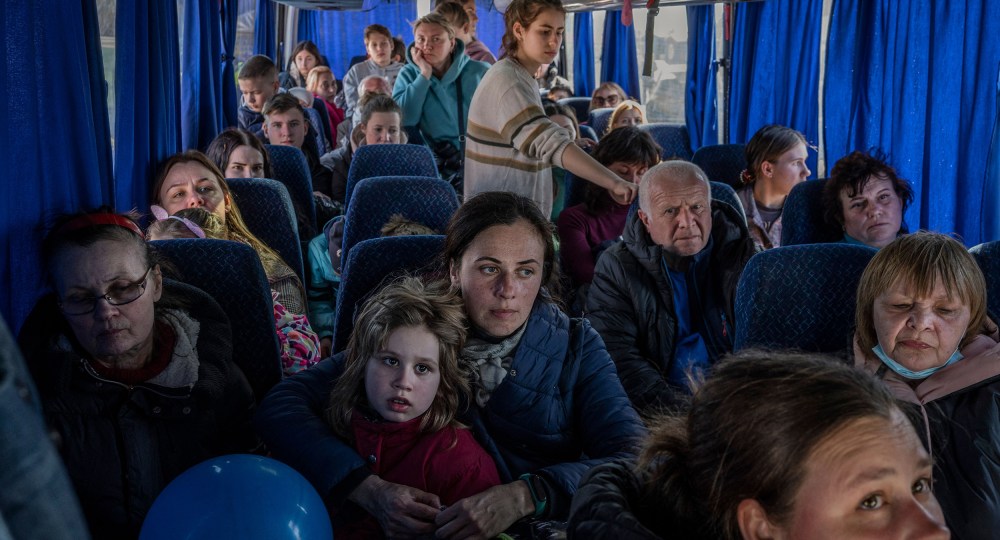Last week, in a fiery address to Israeli lawmakers, Ukrainian President Volodymyr Zelenskyy gave a speech to Israeli parliamentarians equating Russia’s attack on Ukraine with the Holocaust and accusing Moscow of using the “language of the final solution.”
Volodymyr Zelenskyy gave a speech to Israeli parliamentarians equating Russia’s attack on Ukraine with the Holocaust.
Those are provocative words to say to lawmakers in a Jewish state, and, not surprisingly, Israeli Prime Minister Naftali Bennett pushed back. While Bennett said he understands that Zelenskyy is “a leader who is fighting for the life of his country,” he asserted, “I personally believe that it is forbidden to equate the Holocaust to anything.” While it did not directly mention Zelenskyy (who is Jewish), the Israeli Holocaust museum, Yad Vashem, issued its own statement condemning the “trivialization and distortion of the historical facts of the Holocaust.”
Considering the crimes to which his country and its people are being subjected, his use of such incendiary language is hardly surprising — and Bennett was right to cut him some slack.
Still, it is important to point out that while Zelenskyy’s comparison is perhaps understandable, it is not correct. What is happening in Ukraine is horrific and almost certainly evidence of war crimes — but it is not genocide, and it is not comparable to the Holocaust.
The speech was not the first time Zelenskyy had made such direct comparisons to Nazi Germany. After the Russians bombed a maternity hospital in Mariupol, he said the heinous act was “the final proof that what is happening is genocide of Ukrainians.”

Zelenskyy’s chief of staff, Andriy Yermak, echoed his boss’s views, claiming: “Ukrainians are falling victim to Russia’s evil war just as the Jews fell victim to Nazis who wanted to eradicate all Jews. The Russian invaders are motivated and instructed to commit acts of genocide against Ukrainians.”
Ukraine has even brought an allegation of genocide to the International Court of Justice. Far more grotesquely, Russian President Vladimir Putin has made the same accusation against Ukraine, alleging that it mistreated ethnic Russians, which international monitors have said is not true.
But, as we assess these various claims, it is important to keep in mind that the word “genocide” is not simply a rhetorical tool. It is a legal term, codified in international law.
According to the Convention on the Prevention and Punishment of the Crime of Genocide, which took force in 1951, “genocide” constitutes acts “committed with intent to destroy, in whole or in part, a national, ethnical, racial or religious group.”
The word “genocide” is not simply a rhetorical tool. It is a legal term, codified in international law.
There are, unfortunately, clear examples of such acts throughout history — the Nazis’ methodical murder of 6 million Jews; the barbarous spasm of killing in Rwanda in 1994, when Hutu genocidaires used machetes, hoes and other crude weapons to murder 800,000 Tutsis in about 100 days; or the organized deportations and mass killing of Armenians by the Ottoman Turkish government.
Just this month, the U.S. State Department concluded that the Myanmar government’s mass killing of the country’s minority Rohingya population, which has included massacres, gang rapes, burnings of women and children and widespread displacement, amounts to genocide.
What distinguishes those crimes from the situation in Ukraine is the systematic nature of those other atrocities. Genocidal offenses are discriminate, with the clear intention of destroying an entire people. In Ukraine, we are seeing a different type of human rights abuse: the indiscriminate murder of civilians, be they Ukrainian or ethnically Russian. In Russia itself, ethnic Ukrainians are not being targeted by Putin’s government. This is a war against the Ukrainian state, not the Ukrainian people.













